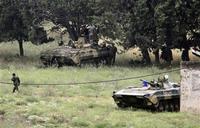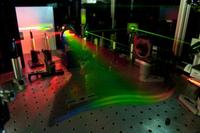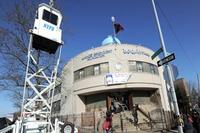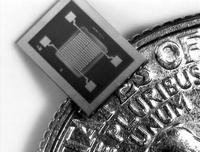-
Disarming Syria of chemical weapons exceedingly difficult, lengthy, uncertain process: experts
The Russian proposal concerning Syria’s chemical weapons is attractive: international inspectors will make a detailed account of Syria’s vast chemical stocks and take control of them; the weapons will be destroyed; and Syria will join the Chemical Weapons Convention. Experts say, however, that it may well be a deceiving attraction because it will be exceedingly difficult to implement and reliably monitor. “After more than 20 years in Iraq, the job still isn’t finished. Syria could be worse,” one expert says.
-
-
Chemical munitions used in 8/21 attack carried larger payload than previously estimated

A new study of the 21 August chemical attack on rebel-controlled areas on the outskirts Damascus found that that the rockets used in the attack carried larger toxic payloads than had previously been estimated. Weapons experts say that the fact that the rockets carried up to fifty times more sarin nerve agent than previously thought helps explain why there were so many more victims than in previous chemical attacks by regime forces.
-
-
Cyberweapons likely to be an integral part of any U.S.-Syria clash
A U.S.-led military attack on Syria may have been averted, at least for a while, by the Russian proposal to negotiate the transfer of Syria’s chemical weapons stocks to international control, but had the United States gone ahead with a strike, there is little doubt that cyberattacks would have been used by both sides. If the United States decides to attack Syria in the future, we should expect cyberweapons to be used.
-
-
Obama: Russia’s chemical weapons proposal may be a “significant breakthrough”
President Obama on Monday described a Russian proposal for Syria to turn over control of its chemical weapons to international monitors in order to avoid a military strike a “potentially positive development,” which could represent a “significant breakthrough.” Obama said, though, that the proposal should be taken “with a grain of salt,” and it was viewed with some skepticism by the administration, with senior officials saying the proposal could possibly be a delaying tactic aimed to undermine Obama’s already tenuous efforts to push for a military strike. The Russian proposal called for Syria to open its chemical weapons stocks to international inspections and give complete account of its stocks; begin the process of supervised destruction of these weapons; and join the Chemical Weapons Convention.
-
-
Bomb-detecting lasers to improve security checkpoints

Research has put the possibility of bomb-detecting lasers at security checkpoints within reach by developing a laser that can detect micro traces of explosive chemicals on clothing and luggage. The laser not only detects the explosive material, but it also provides an image of the chemical’s exact location, even if it’s merely a minute trace on a zipper.
-
-
Researchers fabricate new camouflage coating from squid protein

What can the U.S. military learn from a common squid? A lot about how to hide from enemies, according to researchers. Researchers show that material that mimics calamari skin is invisible to infrared cameras, which is a good thing since infrared detection equipment is employed extensively by military forces for night vision, navigation, surveillance, and targeting.
-
-
Pentagon expands Syria attack plan
The Obama administration, in an effort to mobilize American public opinion to support a strike against Syria, has stressed that any military action would be limited in scope, but the Pentagon is preparing for a longer, and broader, campaign of bombardment of Syria than it originally had planned. The plan includes heavy missile strikes which will be followed by second and third waves of bombing of targets which were not initially destroyed or sufficiently damaged. The plan calls for the use of cruise missiles and aircraft from a U.S. Navy aircraft group in the Red Sea, and long-range bombers from outside the theater.
-
-
Syria’s chemical weapons stocks will not be attacked
Military analysts say Syrian president Bashar Assad will emerge with Syria’s chemical arsenal intact if the United States executes a limited airstrike. The United States contemplates a punitive strike in response to Syria’s use of chemical weapons against Sunni civilians on 21 August – and on about a dozen earlier occasions – but the U.S. attack, if it comes, is not likely to include the depots where the chemical weapons are stored because such an attack may release deadly gases which would cover the neighboring areas with toxic clouds, potentially creating a human and environmental disaster.
-
-
NYPD designated all NYC mosques as terrorist organizations to facilitate broad surveillance

The New York Police Department (NYPD) secretly labeled entire mosques in New York as terrorist organizations, allowing the NYPD to use surveillance techniques including informants and spies without needing evidence or proof of criminal or terrorist activities to investigate the mosques. The investigations, known as Terrorism Enterprise Investigations (TEI), began after the 9/11 attacks on New York City and the Pentagon.
-
-
Flexible vehicle-arrest system stops cars involved in crime, terrorism

Researchers have developed a mathematical model that could help engineers design a flexible vehicle-arrest system for stopping cars involved in criminal activity or terrorism, such as suspect car bombers attempting break through a check point, without wrecking the car or killing the occupants.
-
-
New detectors for chemical, biological threats

In the late 1990s, Sandia scientists developed a simple-to-use handheld chemical detector for the military, the MicroChemLab. Ever since, Sandia has improved such microfluidics- and microelectromechanical (MEMS) systems-based instruments that identify chemicals based on gas chromatography, or GC, and resonator-style instruments such as surface acoustic wave (SAW) detectors. The lab’s researchers are building on this sensor work to invent tiny detectors that can sniff out everything from explosives and biotoxins to smuggled humans.
-
-
Worries grow about Syria’s biological weapons capabilities, intentions
The debates among experts in Western and Middle Eastern intelligence services and militaries about the use of chemical weapons by the Assad regime revolve around how many times Assad has used chemical weapons, not whether such weapons were used. Neighbors of Syria have become increasingly alarmed – and, in private, have expressed their anxiety in discussions with the United States – about another illicit Syrian WMD program: biological weapons. The readiness of the Assad regime to use one proscribed weapon – chemicals — has led to growing unease among Syria’s neighbors that the regime may not find it too difficult to violate other weapon-related taboos. Biological weapons could give the Assad regime an effective means of retaliation because, if the weapon is well-designed, the lethal contents would spread easily without leaving tell-tale signs about the origin of the attack – or even evidence that there has been an attack.
-
-
New systems improve voice recognition
Graduate students and researchers at the University of Texas Dallas have developed novel systems that can identify speaking voices despite conditions that can make it harder to make out a voice, such as whispering, speaking through various emotions, or talking with a stuffy nose.
-
-
Administration's Syria plan: limited operation with “downstream” effect
Three leading administration officials yesterday presented, in general detail, the plan of attack on Syria. The plan emphasizes the destruction of delivery vehicles – missiles, rockets, planes and their airfields, and artillery pieces – used in the delivery of chemical weapons. The three officials – Kerry, Hagel, and Dempsey — agreed that such an attack, even if its purpose would be to degrade the regime’s ability to deliver chemical weapons, would have “downstream” effect: these delivery vehicles also deliver conventional munitions, so their destruction would more generally degrade the regime’s ability to fight, thus making the battlefield between the regime and the rebels more level. The Senate Foreign Relations Committee is today drafting a new resolution which would permit up to ninety days of military action against the Syrian government and bar the deployment of U.S. combat troops in Syria but permit the deployment of a small rescue mission in the event of an emergency. The White House also would be required within thirty days of enactment of the resolution to send lawmakers a plan for a diplomatic solution to end the violence in Syria.
-
-
Fusion centers collect information on non-threatening groups

Since the 9/11 attacks, federal and state surveillance of nonviolent student groups, protest movements, and mosques has increased along with the growth of fusion centers. Fusion centers serve as the focal points for the receipt, analysis, gathering, and sharing of threat-related information. According to DHS, there are fifty-three primary fusion centers and twenty-five recognized fusion centers across the United States.
-
More headlines
The long view
Tantalizing Method to Study Cyberdeterrence
Tantalus is unlike most war games because it is experimental instead of experiential — the immersive game differs by overlapping scientific rigor and quantitative assessment methods with the experimental sciences, and experimental war gaming provides insightful data for real-world cyberattacks.
Using Drone Swarms to Fight Forest Fires
Forest fires are becoming increasingly catastrophic across the world, accelerated by climate change. Researchers are using multiple swarms of drones to tackle natural disasters like forest fires.
Testing Cutting-Edge Counter-Drone Technology
Drones have many positive applications, bad actors can use them for nefarious purposes. Two recent field demonstrations brought government, academia, and industry together to evaluate innovative counter-unmanned aircraft systems.
European Arms Imports Nearly Double, U.S. and French Exports Rise, and Russian Exports Fall Sharply
States in Europe almost doubled their imports of major arms (+94 per cent) between 2014–18 and 2019–23. The United States increased its arms exports by 17 per cent between 2014–18 and 2019–23, while Russia’s arms exports halved. Russia was for the first time the third largest arms exporter, falling just behind France.
How Climate Change Will Affect Conflict and U.S. Military Operations
“People talk about climate change as a threat multiplier,” said Karen Sudkamp, an associate director of the Infrastructure, Immigration, and Security Operations Program within the RAND Homeland Security Research Division. “But at what point do we need to start talking about the threat multiplier actually becoming a significant threat all its own?”
The Tech Apocalypse Panic is Driven by AI Boosters, Military Tacticians, and Movies
From popular films like a War Games or The Terminator to a U.S. State Department-commissioned report on the security risk of weaponized AI, there has been a tremendous amount of hand wringing and nervousness about how so-called artificial intelligence might end up destroying the world. There is one easy way to avoid a lot of this and prevent a self-inflicted doomsday: don’t give computers the capability to launch devastating weapons.
